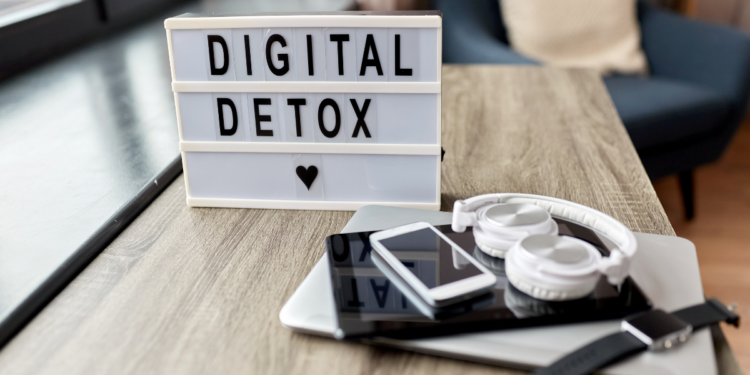In an age dominated by smartphones, social media, and constant notifications, it’s easy to feel overwhelmed and distracted. Our digital habits can take a toll on mental health, reduce focus, and blur the boundaries between work and personal life. A digital detox—a deliberate break from screens and digital devices—offers a way to reclaim your attention, recharge your mind, and rediscover mental clarity.
This guide explores the benefits of a digital detox, how it improves focus, and actionable steps to create healthier digital habits.
Why Consider a Digital Detox?
While technology has undeniable benefits, overuse can lead to:
- Mental Fatigue: Constant screen exposure overstimulates the brain, making it harder to concentrate.
- Reduced Productivity: Multitasking between apps and devices hampers efficiency.
- Sleep Disruption: Blue light from screens interferes with melatonin production, affecting sleep quality.
- Strained Relationships: Excessive screen time can limit meaningful in-person interactions.
A digital detox helps reset your habits and prioritize what truly matters.
To learn how disconnecting from devices can improve your mental and physical well-being, check out Digital Detox: Benefits and Tips from Cleveland Clinic. This guide offers practical advice for taking a break from technology and reconnecting with life offline.
The Benefits of a Digital Detox
1. Improved Focus
Taking a break from digital distractions enhances your ability to concentrate on tasks. Without constant notifications, your mind can stay on track and engage in deep work.
2. Enhanced Mental Clarity
Disconnecting from screens reduces cognitive overload, giving your brain space to process thoughts and ideas more effectively.
3. Better Sleep
Reducing screen time before bed improves melatonin production, leading to deeper, more restorative sleep.
4. Reduced Stress and Anxiety
Studies show that stepping away from social media and excessive screen use lowers cortisol levels, reducing stress.
5. Stronger Relationships
Spending less time on devices creates opportunities for more meaningful connections with family and friends.
6. Increased Creativity
A digital detox encourages boredom—a key ingredient for creativity—by giving your mind the freedom to wander and innovate.

How to Start Your Digital Detox
A digital detox doesn’t have to mean ditching technology altogether. Small, intentional changes can make a big difference. Here’s how to get started:
1. Set Clear Goals
Determine what you want to achieve:
- Reduce screen time.
- Improve focus during work hours.
- Spend more quality time with loved ones.
2. Establish Tech-Free Zones
Designate areas like the bedroom, dining table, or living room as no-phone zones to promote mindful living.
3. Schedule Screen-Free Hours
Block out specific times during the day to unplug, such as:
- An hour before bedtime.
- The first 30 minutes after waking up.
- During meals.
4. Use Digital Wellbeing Tools
Apps like Moment, Forest, or Screen Time help track and limit device usage. Many smartphones also have built-in features to monitor screen time and set app limits.
5. Engage in Offline Activities
Replace screen time with enriching offline activities, such as:
- Reading a physical book.
- Journaling or sketching.
- Exercising or practicing yoga.
- Spending time in nature.
For more strategies to reduce screen time and improve mental clarity, explore Digital Detox: Tips for Reconnectingwith Life Offline from Health.com. This article highlights practical ways to unplug and enhance your well-being.

Tips for Maintaining a Digital Detox
1. Turn Off Non-Essential Notifications
Only allow alerts for essential apps like calls, messages, or calendar events.
2. Batch Online Activities
Limit social media and email checks to specific times of the day instead of constantly scrolling or replying.
3. Declutter Your Devices
Uninstall apps that drain your time or energy and organize your home screen to prioritize productivity.
4. Communicate Your Plan
Let family, friends, and colleagues know about your detox to set expectations and reduce interruptions.
5. Celebrate Small Wins
Acknowledge progress, whether it’s an hour of uninterrupted focus or a day spent entirely offline.
The Science Behind Digital Detoxing
Research supports the positive impact of reducing screen time:
- Improved Cognitive Function: A study in Psychological Science found that limiting smartphone use increases cognitive capacity and working memory.
- Lower Stress Levels: Participants in digital detox programs report significant reductions in anxiety and stress.
- Boosted Emotional Well-Being: Reducing social media exposure improves mood and self-esteem by decreasing comparisons with others.
7-Day Digital Detox Plan to Improve Focus and Clarity
Follow this simple plan to ease into a digital detox:
Day 1: Audit Your Digital Habits
- Identify the apps or activities that consume the most time.
- Note when and why you reach for your phone.
Day 2: Set Boundaries
- Establish tech-free zones in your home.
- Turn off notifications for non-essential apps.
Day 3: Introduce Screen-Free Mornings
- Start your day without checking your phone for at least 30 minutes.
- Replace this time with mindfulness or journaling.
Day 4: Engage in Offline Hobbies
- Dedicate time to an activity you enjoy, such as gardening, cooking, or exercising.
Day 5: Try a Social Media Fast
- Avoid all social media platforms for the day.
- Use this time to connect with friends or family in person.
Day 6: Reflect and Reset
- Spend 10–15 minutes journaling about how you feel without constant digital distractions.
- Adjust your detox plan based on what’s working.
Day 7: Go Fully Offline for a Day
- Plan an entire day without screens.
- Focus on activities like hiking, reading, or playing board games.

Long-Term Benefits of a Digital Detox
Once you’ve completed your detox, you’ll likely notice lasting improvements:
- Increased Productivity: Enhanced focus and time management.
- Better Mental Health: Reduced stress, anxiety, and screen-induced fatigue.
- Stronger Relationships: More meaningful interactions with loved ones.
By incorporating regular screen-free periods into your routine, you can maintain these benefits while staying connected to the digital world in a healthy way.
Final Thoughts
A digital detox is not about completely eliminating technology but about finding balance. By reclaiming your focus and reducing the noise of constant connectivity, you can enjoy improved mental clarity, better relationships, and a more fulfilling life. Start small, be consistent, and watch as your mind and body reap the benefits of unplugging.
For a simple practice to enhance your emotional well-being, explore our guide on Gratitude Journaling to BoostMental Wellness. Learn how daily gratitude can transform your mindset and improve mental health.






















Comments 2